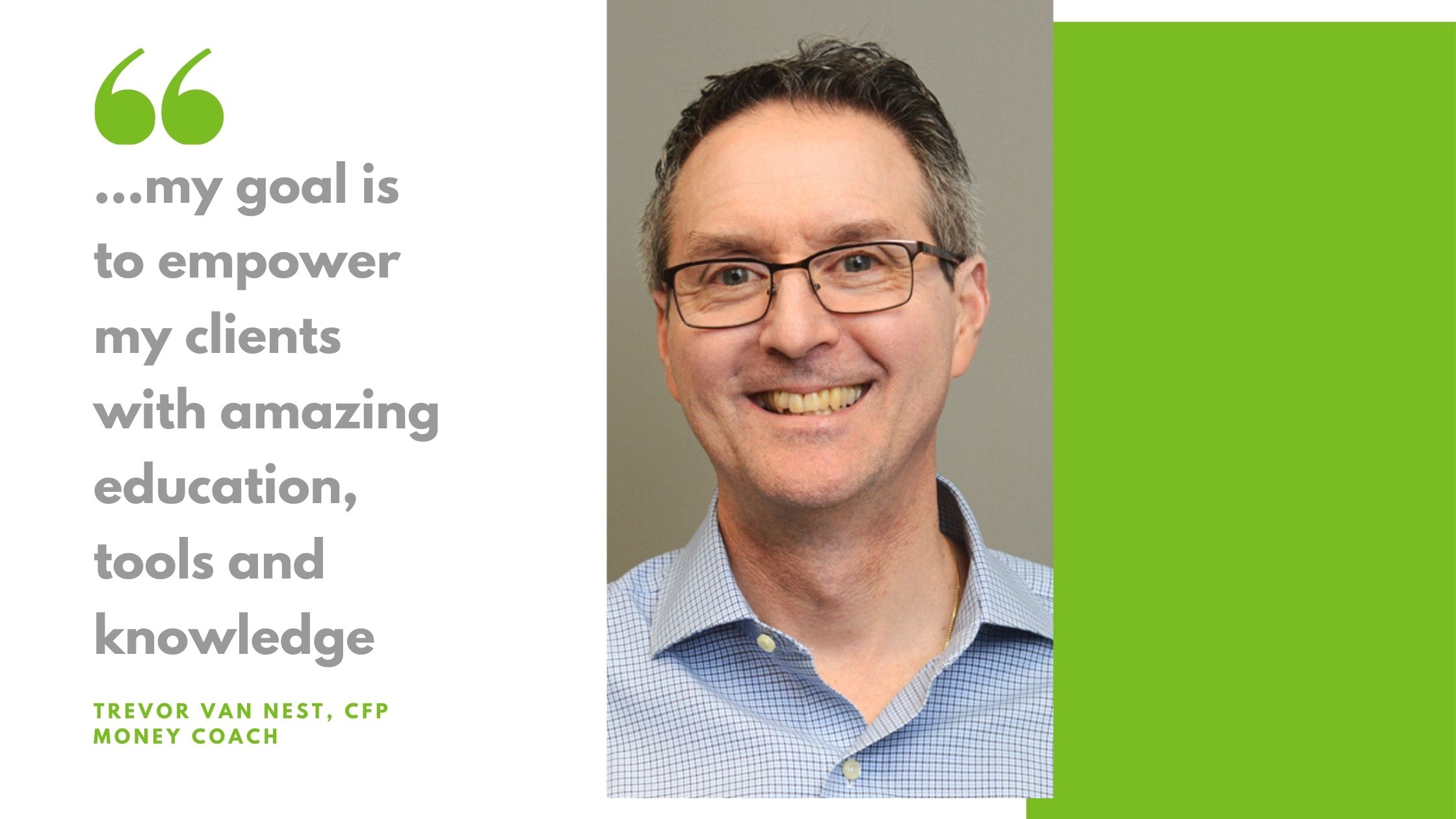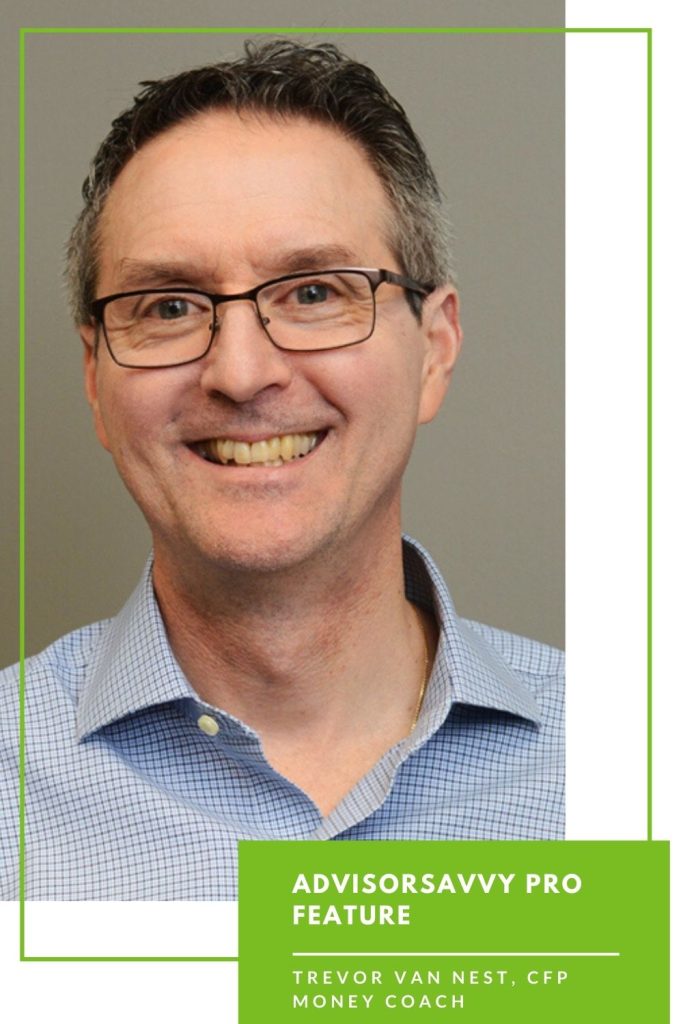
Trevor Van Nest, Founder and Owner of Niagara Region Money Coaches, St. Catherines, Ontario, “My goal is to empower my clients with amazing education, tools and knowledge.”
What is a financial coach?
For Trevor Van Nest, being a financial coach (or money coach) isn’t about selling clients complicated financial products. It’s about being a teacher. He believes a true financial coach educates clients. This is how he helps his clients achieve financial freedom.
Trevor, a former Fortune 500 executive, is a Certified Financial Planner and entrepreneur. He has founded two award-winning firms, York Region Money Coaches and Niagara Region Money Coaches.
Give him 15 minutes of your time and it will quickly become obvious that Trevor considers being a financial coach his true calling. What does he find most rewarding? Personally guiding clients through the complexities of the financial world, and helping them achieve what he calls “financial peace.”
How do you become a financial coach?
Trevor graduated from Queen’s University in 1991 with a business degree. He is just as proud of his qualification as a Certified Financial Planner. The designation is considered to be the gold standard in the industry. It represents the highest level of professional integrity, knowledge and experience. Maintaining the certification requires ongoing education, something Trevor is clearly passionate about.
In addition to his educational background, Trevor has racked up decades of experience working at one of the biggest names in the financial industry.
“I was at American Express for 20 years,” says Trevor. During that time, he held a number of key roles, including vice-president of marketing and head of product development. He also held roles in customer acquisition, customer retention, loyalty programs and banking services.
All of these experiences have given him a strong background in the financial services industry. So what prompted Trevor to make a change?
“About 11 years ago, I really wanted to change gears,” says Trevor. “I saw a huge gap in the financial literacy of Canadians. There is also a huge gap in the service delivery from the financial industry, which is still busy focusing on high net worth and affluent families. So many Canadians are underserved in this very important space.”
As a result, Trevor launched York Region Money Coaches in Newmarket in 2010.
Becoming a money coach in Ontario.
In 2014, York Region Money Coaches earned the Professional Services Business of the Year Award from the Newmarket Chamber of Commerce. At the time, Trevor was one of the first money coaches in the country.
It was becoming clear that Trevor’s business model was resonating with Canadians looking for something different than a typical financial planner, banker or insurance-sales person.
The same year, Trevor moved to Niagara Falls and established Niagara Region Money Coaches. He is the only money coach — and the only flat-fee certified financial planner — in the Niagara Region.
“I get to do what I love all day, which is teach,” says Trevor. “My purpose is to help people make great financial decisions, and provide unbiased and objective financial advice. It’s something most people want… but most don’t really know where to find it.”
A true financial literacy coach.
Trevor sets himself apart by providing clients with unbiased and objective advice. Furthermore, he skills up his client’s level of financial literacy. He prides himself on being unlike the average financial advisor by putting his clients’ needs first.
“I know enough about this industry that if I’m doing the opposite of what most people are doing, I’m probably doing an amazing job,” says Trevor. “Most financial planners are trying to talk circles around their clients, and sell them expensive products that can’t keep up with the market.
“Their clients can’t explain what’s in their RRSP. There is no talk about the expense side of things, or the impact of taxes. These planners also do not create a dynamic retirement plan. I do all of those things in spades.”
Empowerment through education.
“My goal is to empower my clients with amazing education, tools and knowledge. This way they can make great financial choices for themselves and for their families, so they can retire comfortably knowing they’re not going to run out [of funds].”
To calculate retirement needs, Trevor uses advanced software to run after-tax cash flow projections, among other calculations. The purpose is to paint a picture for clients that helps them understand what’s required to achieve their goals.
“This stuff isn’t taught in school,” says Trevor. “So I’m often meeting with really smart people — often with very high incomes — who have never been told, ‘Did you know that you’re actually eating your retirement away?’
“Not everyone is spending $800 a month in restaurants, and if you spent $300 in restaurants instead of $800 and invested the difference, that could be three years of retirement expenses.”
It’s the ability to educate clients that Trevor feels so strongly about. He says that many financial coaches aren’t actually talking with their clients and telling them what they truly need to hear.
“And so what I get to do, and this is in honour of mine honestly, is to sit down with people who really want to learn,” says Trevor.
What’s different about Trevor’s financial coaching services?
“In terms of what’s unique, I would hope everything,” says Trevor.
Probably one of the biggest differentiators is that Trevor considers his best clients to be great students.
“They’re super keen to hear from someone who has no vested interest in their decisions,” says Trevor. “One hundred percent of my revenue comes directly from my clients in the flat fees that I charge.”
That’s a big point of differentiation.
Many planners say the advice they provide is objective. But often, they’re paid through a variety of kickbacks from other financial service providers.
With Trevor, there’s no pitch for a mutual fund or an insurance product at the end of a meeting. Instead, he prefers to create “highly customized agendas” to meet the specific needs of each client.
“I can tell every one of my clients that I have never received any money from anyone, ever, other than them,” says Trevor. “No kickbacks. I’ve got a great network, and of course I’ve got all the people in my network who do their thing; brokers, lawyers, accountants. But I receive nothing from them. It insures a level of trust and objectivity. That’s what most people are looking for.”
And Trevor’s unique stance as a money coach seems to be working for him. In his own words, he’s “tapped into something.” But it didn’t come without resistance. Trevor had to press ahead despite some early warnings. Often, people would tell him that “no one would ever pay for financial advice.”
“You and I both know that everyone’s paying for financial advice — whether they know it or not,” says Trevor. “Sometimes it’s embedded in the management expense ratios of the funds that aren’t transparent. And sometimes it’s in the insurance product, buried deep into the front-load fees. But my clients know exactly what they’re paying for and they know exactly what they’re getting.”
What is it like to be a client?
“My clients don’t pay me to tell them what they want to hear,” says Trevor. “But they do pay for what I know they need to hear. And there’s an incredible difference between those two things.”
Being a client of Trevor’s — a true money coach focused on increasing financial literacy — means working backwards from a problem. He customizes solutions to fit each individual need, while helping clients understand investment strategy.
“We cover all aspects of a financial plan to make sure wills and powers of attorney are updated,” says Trevor. “The goal is to make sure the investments are doing what they’re supposed to do. I also want to make sure fees are low, and that my clients are living below their means so they can get rid of debt.”
Who is a typical client?
Trevor isn’t teaching a prerequisite masterclass. He openly admits that investing strategy isn’t a space that many people have a great deal of interest in.
“Often, my clients are a one or two out of 10 in terms of investing knowledge,” says Trevor. “And very few of them are truly interested in it. But honestly, what’s best for Canadians is not rocket science. The industry often wants us to believe it’s almost impossible to do this on our own. Everyone should be able to understand how they should be investing.”
To that end, Trevor doesn’t have a target market or strict client base. In the week we spoke with him, he had met with an 18-year-old, a high-income couple, and one local resident struggling to pay their bills.
“I love the diversity of my clients. Everyone has a different goal,” says Trevor. “And I love the fact that I’ve been doing this long enough to know that I can virtually help anyone who has a desire to learn and to put in place whatever is going to help them down the road.”
What are some of Trevor’s investing principles?
- “Live below your means.”
- “Keep your fees as low as possible.”
- “Don’t try to beat the market; just be the market.”
- “Appreciate why ETFs are as popular as they are; this is not a fad.”
- “Mutual funds are awful and whole-life products, for the most part, should be avoided.”
Trevor openly shares all of these ideas and concepts with his clients. Together, they compare different strategies. That way clients don’t just know what they should have, but also what questions they should ask of their planner. He wants his clients to know what is in their best interest versus the interests of a very profitable industry.
A financial coach for Canada.
Trevor decided to become a money coach after becoming concerned about troubling financial trends in Canada.
“We’re dealing with a bit of a toxic combination in Canada,” says Trevor. “There is a lack of financial literacy among Canadians, generally. The banking industry makes billions of dollars off of that lack of literacy. Add to that a kind of consumerism on steroids — people really wanting to upsize and upgrade everything. And we’ve got a Jones’s factor that wants us to keep up with our neighbours. With all of those things combined, sometimes you have some pretty ugly outcomes.”
Trevor’s remedy for Canadians is to empower and educate them so they can separate themselves from the narrative pushed by culture and industry.
“I talk to all of my clients about cash flow and spending and the daily things— the habits — that might be sabotaging their future,” says Trevor. “The empowerment you feel when you live below your means every month verses spending $500 more than you make every month is the difference between incredible contentment and incredible stress.”
What motivates Trevor?
Anyone talking to Trevor for any length of time can immediately tell he’s living his dream career. He gets legitimate joy out of educating and helping clients reach their financial goals.
“I am doing what I believe is honestly my calling,” says Trevor. “When I get people in front of me who are keen to learn and are excited to have finally met someone — and honestly I’ve had some people say, ‘I’ve been looking for someone like you for five years, where have you been?’ When that sort of thing happens, I know what I’m doing is unique.”
“My goal, honestly, is to help them help themselves, and to put them in a great financial position where there are no regrets in 10, 15, 20 years.”
Any good books Trevor recommends?
Wealthy Barber Returns by David Chilton
How can you get in contact with Trevor?
You can contact Trevor and see his reviews HERE
You can also hear more from Trevor through his spots on the “Money Coaching Minute.”

